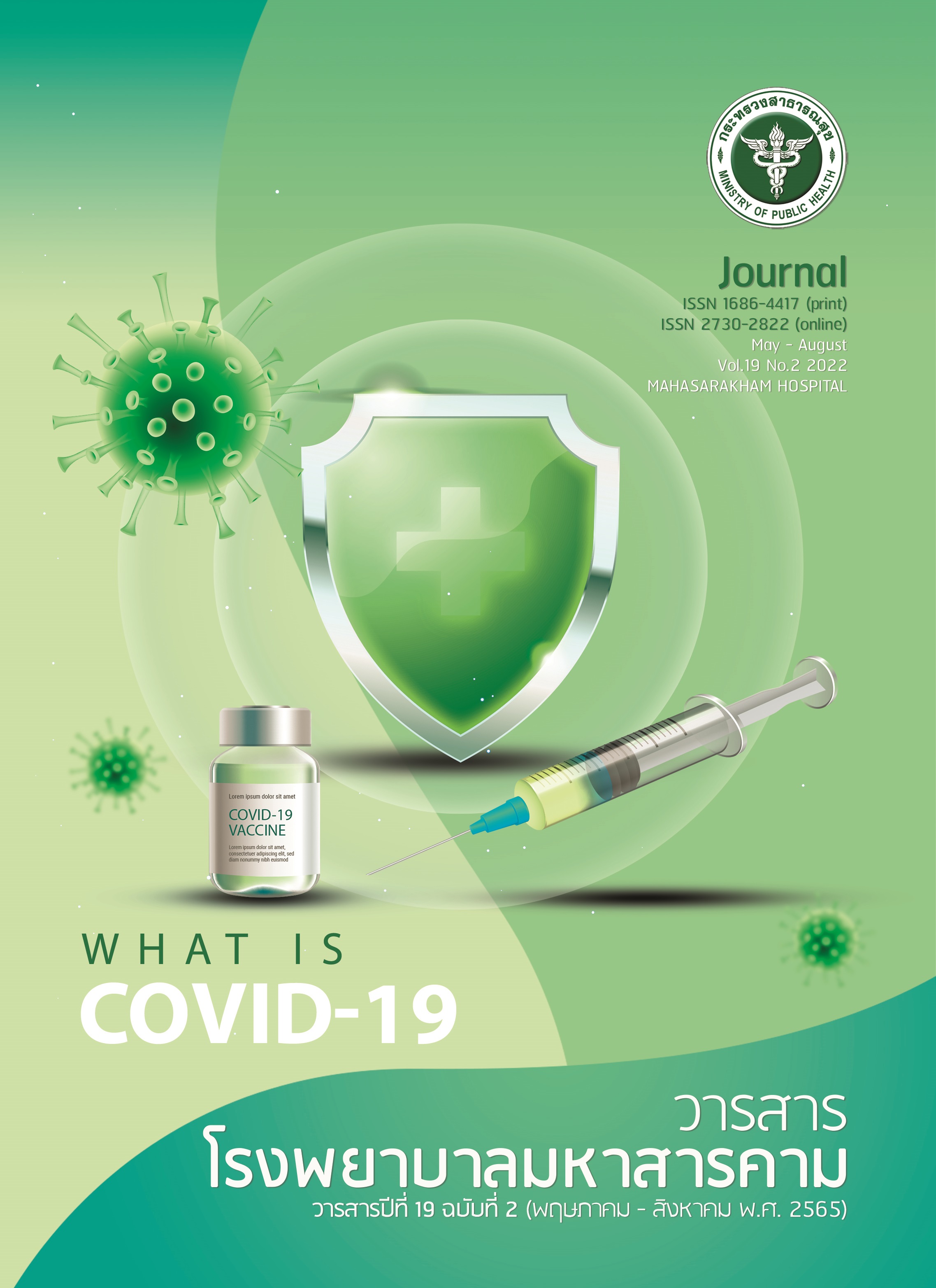ความชุกและปัจจัยที่สัมพันธ์กับความเครียดและความวิตกกังวลต่อ COVID-19 ในผู้ที่มาเข้ารับบริการทางการแพทย์ที่แผนกผู้ป่วยนอก อำเภอเมือง มหาสารคาม
คำสำคัญ:
โควิด-19, ความเครียด, ความวิตกกังวลต่อไวรัสโควิด-19, ปัจจัยเสี่ยงบทคัดย่อ
วัตถุประสงค์ : เพื่อศึกษาความชุกของความเครียดและความวิตกกังวลต่อไวรัส COVID-19 และปัจจัยที่เกี่ยวข้อง ในผู้ที่มาเข้ารับบริการทางการแพทย์
วิธีการศึกษา : ศึกษาแบบตัดขวาง (Cross sectional study) ในผู้ที่มาเข้ารับบริการที่แผนกผู้ป่วยนอก ในสถานพยาบาลจำนวน 21 แห่ง เกณฑ์การคัดเข้าสู่การศึกษาได้แก่ ผู้ที่อายุ 18 ปีขึ้นไปที่มาเข้ารับการบริการที่สถานพยาบาลที่กำหนดและสมัครใจเข้าร่วมการวิจัย เกณฑ์การคัดออกจากการศึกษาได้แก่ผู้ที่มีความบกพร่องด้านการสื่อสาร และผู้ที่มีโรคประจำตัวด้านสุขภาพจิต
ผลการศึกษา: ผู้เข้าร่วมการศึกษา 404 ราย พบความชุกของผู้ที่มีระดับความเครียดมากและระดับความเครียดมากที่สุด 6.19% ปัจจัยที่สัมพันธ์กับความเครียดได้แก่ สถานภาพสมรส และสมาชิกในครอบครัวเคยติดโควิด ความชุกของความวิตกกังวลต่อไวรัส COVID-19 ในระดับมาก 11.63% ปัจจัยที่สัมพันธ์กับความวิตกกังวลต่อไวรัส COVID-19 ได้แก่ อาชีพที่ต้องพบกับคนจำนวนมาก และความเพียงพอของรายได้
สรุปผลการศึกษา: ความชุกของความเครียดในปัจจุบันอยู่ในระดับต่ำกว่าช่วงต้นของการแพร่ระบาด แต่ความวิตกกังวลต่อไวรัส COVID-19 ส่วนใหญ่อยู่ในระดับปานกลาง จึงควรเฝ้าระวังโดยเฉพาะในประชากรที่ได้รับผลกระทบและประชากลุ่มเสี่ยงตามปัจจัยที่ศึกษาพบเพื่อจะช่วยให้สามารถให้การดูแลช่วยเหลือได้อย่างรวดเร็วขึ้น
เอกสารอ้างอิง
World Health Organization. Coronavirus disease 2019 (COVID-19) Situation Report-51 [Internet]. [Cited 2021 Dec 30]. Available from: https://www.who.int/emergencies/diseases/novel-coronavirus-2019/situation-reports
WHO Coronavirus (COVID-19) Dashboard [Internet]. [Cited 2021 Dec 30]. Available from: https://covid19.who.int/
กรมควบคุมโรค. โรคติดเชื้อไวรัสโคโรนา 2019 (covid-19) สถานการณ์ในประเทศไทย [Internet]. [Cited 2021 Dec 30]. Available from: ddc.moph.go.th/viralpneumonia/
Mark Shevlin, Orla McBride, Jamie Murphy, Jilly Gibson Miller, Todd K. Hartman, Liat Levita, et al. Anxiety, depression, traumatic stress and COVID-19 related anxiety in the UK general population during the COVID-19 pandemic. 2020. 6(6):e125.
Maxime Marvaldi, Jasmina Mallet, Caroline Dubertret, Marie Rose Moro, S´elim Benjamin Guessoum. Anxiety, depression, trauma-related, and sleep disorders among healthcare workers during the COVID-19 pandemic: A systematic review and meta-analysis. Neuroscience and Biobehavioral Reviews. 126(2021):252–64.
Yuvaraj Krishnamoorthy, Ramya Nagarajan, Ganesh Kumar Saya, Vikas Menon. Prevalence of psychological morbidities among general population, healthcare workers and COVID-19 patients amidst the COVID-19 pandemic: A systemic review and meta-analysis. Psychiatry Research. 293(2020):113382.
Jiaqi Xiong, Orly Lipsitz, Flora Nasri, Leanna M.W. Lui, Hartej Gill, Lee Phan, et al. Impact of COVID-19 pandemic on mental health in general population: A systemic review. Journal of Affective Disorders. 277(2020):55–64.
Tianchen Wu, Xiaoqian Jia, Huifeng Shi, Jieqiong Niu, Xiaohan Yin, Jialei Xie, et al. Prevalence of mental health problems during the COVID-19 pandemic: A systemic review and meta-analysis. Journal of Affective Disorders. 281(2021):91–8.
กรมควบคุมโรค. โรคติดเชื้อโคโรนาไวรัส [Internet]. [Cited 2022 Jan 1]. Available from: https://ddc.moph.go.th/viralpneumonia/
Matthias Pierce, Sally Mcmanus, Holly Hope, Matthew Hotopf, Tamsin Ford, Stephani L Hatch, et al. Mental health responses to the COVID-19 pandemic: a latent class trajectory analysis using longitudinal UK data. Lancet Psychiatry. 2021;8:610–9.
World Health Organization. Update on Omicron [Internet]. [Cited 2021 Dec 30]. Available from: Https://www.who.int/news/item/28-11-2021-update-on-omicron
กรมสุขภาพจิต. คู่มือการปฏิบัติงานทีมช่วยเหลือเยียวยาจิตใจผู้ประสบภาวะวิกฤตในกรณีการระบาดของโรคติดเชื้อไวรัสโคโรนา 2019 (COVID-19) [Internet]. [Cited 2565 Jul 21]. Available from: https://www.dmh.go.th/covid19/pnews/
Paula R. Pietromonaco, Nickola C. Overall. Implications of social isolation, separation, and loss during the COVID-19 pandemic for couples’s relationship. Current opinion in Psychology 2022. 43:189–94.
Janneke M. Schokkenbroek, Wim Hardyns, Sarah Anrijs, Koen Ponnet. Partners in Lockdown: Relationship Stress in Men and Women During the COVID-19 Pandemic. Couple and Family Psychology Research and Practice. 2021;10(3):149–57.
Anne C Gadermann, Kimberly C Thomson, Chris G Richardson, Monique Gagne, Corey McAuliffe, Saima Hirani, et al. Examining the impacts of the COVID-19 pandemic on family mental health in Canada: findings from a national cross-sectional study. BMJ open 2021. 11:e042871.
Nathaniel M Lewis, Victoria T Chu, Dongni Ye, Erin E Conners, Radhika Gharpure, Rebecca L Laws, et al. Household Transmission of Severe Acute Respiratory Syndrome Coronavirus-2 in The United States. Clinical Infectious Disease. 2021 Oct 1;73(7):e1805–13.
Le Shi, Zheng-An Lu, Jian-yu Que, Xiao-Lin Huang, Lin Liu, Mao-Sheng Ran, et al. Prevalence of and Risk Factors Associates with Mental Health Symptoms Among the General Population in China During the Coronavirus Disease 2019 Pandemic. 2020. 3(7):e2014053.
Hong-juan Jiang, Jiang nan, Zhi-yue Lv, Juan Yang. Psychological impacts of the COVID-19 epidemic on Chinese people: Exposure, post-traumatic stress symptom, and emotional regulation. Asian Pacific Journal of Tropical Medicine. 2020;13(6):252–9.
Yuta Tanoue, Shuhei Nomura, Daisuke Yoneoka, Takayuki Kawashima, Akifumi Eguchi, Shoi Shi, et al. Mental health of family, friends, and co-workers of COVID-19 patients in Japan. Psychiatry Research. 291(2020):113067.
World Health Organization. Coronavirus disease (COVID-19): How is it transmitted? [Internet]. [Cited 2565 Jan 6]. Available from: Https://www.who.int/news-room/questions-and-answers/item/coronavirus-disease-covid-19-how-is-it-transmitted
Ilana Haliwa, Jenna Wilson, Jerin Lee, Natalie J. Shook. Predictors of Change in Mental Health during the COVID-19 Pandemic. Journal of Affective Disorders. 291:331–7.
Craig Polizzi, Steven Jay Lynn, Andrew Perry. Stress and coping in the time of COVID-19: Pathways to resilience and recovery. 2020. 17(2):59–62.
กรมสุขภาพจิต. เปลี่ยนร้ายกลายเป็นดี พลังสุขภาพจิต RQ: resilience Quotient [Internet]. [Cited 2565 Mar 20]. Available from: Https://dmh.go.th/covid19/download/
ดาวน์โหลด
เผยแพร่แล้ว
รูปแบบการอ้างอิง
ฉบับ
ประเภทบทความ
สัญญาอนุญาต
ลิขสิทธิ์ (c) 2022 วารสารโรงพยาบาลมหาสารคาม

อนุญาตภายใต้เงื่อนไข Creative Commons Attribution-NonCommercial-NoDerivatives 4.0 International License.
วารสารนี้เป็นลิขสิทธิ์ของโรงพยาบาลมหาสารคาม






